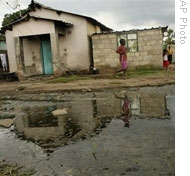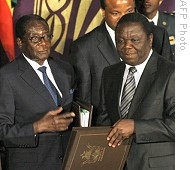voa标准英语2008年-Concern Grows Over Cholera Outbreak in Zimbabwe(在线收听)
 |
| A child walks barefoot past rain water and sewage near Harare, Zimbabwe, 25 Nov 2008 |
A senior Zimbabwean health official Thursday appealed for international aid to fight a growing epidemic of cholera which he said has killed nearly 400 people.
His call came as cholera cases were detected in neighboring South Africa and Botswana, mostly among travelers arriving from Zimbabwe.
South African Health Minister Barbara Hogan said South African health services are trying to care for the Zimbabwean victims.
"Given the scale of the outbreak, the weakened health system in Zimbabwe and the extended cross border movement of people it was agreed that all aspects of our interventions needed to be scaled up and a renewed sense of urgency to deal with this outbreak is needed at all levels," she said.
But she added that a major focus should be to help repair sanitation plants and provide clean water in Zimbabwe.
The United Nations reported nearly 9,000 cases of cholera in Zimbabwe, saying the water-borne disease had spread due to collapsing health and sanitation systems. Zimbabwe's public services have experienced serious decay due to economic decline, shortages of basic goods and the flight of skilled workers.
U.N. officials also said nearly half of the country's population of 10 million people needed food assistance and this number was likely to increase in the coming months. But they said food aid would run out in January unless additional donations were forthcoming.
 |
| Zimbabwe President Robert Mugabe, left, and new Prime Minister Morgan Tsvangirai pose after signing the power-sharing accord, 15 Sept 2008 |
There have been calls for increased isolation of the government of President Robert Mugabe because of a lack of progress in crisis talks between the country's three main parties.
The talks are aimed at forming a government of national unity more than two months after the parties signed a power-sharing accord. Under the accord, Mr. Mugabe's ZANU-PF party is to divide government ministries with two factions of the Movement for Democratic Change which won a majority of parliamentary seats in elections eight months ago.
The leader of the main MDC faction, Prime Minister-designate Morgan Tsvangirai, Wednesday issued a statement saying his party was shifting its focus from the power-sharing talks to the humanitarian crisis.
He accused Mr. Mugabe's ZANU-PF party of refusing to implement the power-sharing accord. He also called the mediator in the talks, former South African President Thabo Mbeki, to step down accusing him of failing to understand the country's problems and of supporting ZANU-PF.
The statement also criticized the reappointment Wednesday of Central Bank Governor Gideon Gono to a new five-year term. It accused Gono of being the architect of Zimbabwe's economic crisis, characterized by falling productivity, hyper-inflation and 80 percent unemployment.
However, Mr. Tsvangirai said his party was not withdrawing from the power-sharing talks and would continue to participate in the discussions.